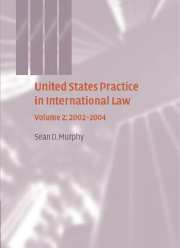Book contents
- Frontmatter
- Contents
- Foreword by Judge Stephen M. Schwebel
- Acknowledgments
- Table of Periodical Abbreviations
- Table of Cases
- Table of U.S. Statutes
- Table of Treaties
- I General International and U.S. Foreign Relations Law
- II State Diplomatic and Consular Relations
- III State Jurisdiction and Immunities
- IV State Responsibility and Liability
- V International Organizations
- VI International Oceans, Environment, Health, and Aviation Law
- VII International Economic Law
- VIII International Human Rights
- IX International Criminal Law
- X Use of Force and Arms Control
- XI Settlement of Disputes
- XII Private International Law
- Annex
- Index
I - General International and U.S. Foreign Relations Law
Published online by Cambridge University Press: 10 December 2009
- Frontmatter
- Contents
- Foreword by Judge Stephen M. Schwebel
- Acknowledgments
- Table of Periodical Abbreviations
- Table of Cases
- Table of U.S. Statutes
- Table of Treaties
- I General International and U.S. Foreign Relations Law
- II State Diplomatic and Consular Relations
- III State Jurisdiction and Immunities
- IV State Responsibility and Liability
- V International Organizations
- VI International Oceans, Environment, Health, and Aviation Law
- VII International Economic Law
- VIII International Human Rights
- IX International Criminal Law
- X Use of Force and Arms Control
- XI Settlement of Disputes
- XII Private International Law
- Annex
- Index
Summary
OVERVIEW
As demonstrated throughout this volume, during 2002–2004 the United States continued in its role as a critical player with respect to international legal initiatives and as a major supporter of a variety of international organizations, including dispute resolution fora. At the same time, the United States resisted having various initiatives under international law apply to the United States, notably the International Criminal Court, the Kyoto Protocol on climate change, and the UN Convention on the Law of the Sea. Further, while the United States marshaled considerable global support for the “war on terrorism” through UN Security Council sanctions and other measures, the United States resisted the application of the 1949 Third Geneva Convention and human rights instruments to persons detained in Afghanistan and elsewhere in the course of waging that war. Such resistance led many states and observers to criticize the United States as embarking on a unilateralist or “exceptionalist” course. Despite this, the United States viewed international law and its institutions as an important component of U.S. foreign policy, and international law and foreign law continued to influence the development of U.S. law, as may be seen in various cases of the U.S. Supreme Court.
U.S. INFLUENCE ON INTERNATIONAL LAW
President Bush 2004 Speech to UN General Assembly
In September 2004, U.S. President George W. Bush spoke to the UN General Assembly regarding the desire of theUnited States to join with other nations in initiatives that promote security, prosperity, human rights, and the rule of law in international affairs:
The United Nations and my country share the deepest commitments. Both the American Declaration of Independence and the Universal Declaration of Human Rights proclaim the equal value and dignity of every human life. […]
- Type
- Chapter
- Information
- United States Practice in International Law , pp. 1 - 17Publisher: Cambridge University PressPrint publication year: 2006



